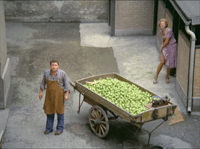Hans Epp (Hans Hirschmuller) betrays few traces of his eroding morale as he lyrically announces his daily merchandise into the open air. He is an unassuming fruit vendor, diligently making his rounds through the residential streets, accompanied by his highly critical wife, Irmgard (Irm Hermann). After chastising him for hand delivering an order to an ex-lover (Ingrid Caven), Hans escapes her incessant complaints by abandoning his cart and going into a nearby bar. Soon, the sad ritual of his empty existence emerges: arguing with his wife, drinking excessively, lamenting lost personal and professional opportunities. One evening, an inebriated Hans returns home and becomes physically abusive, causing Irmgard to flee to his mother’s house with their daughter (Andrea Schober). His mother (Gusti Kreissl) is a stern, unaffectionate woman who has never concealed her disappointment in Hans, and his recent violence only furthers her disdain. Only Hans’ younger sister, Anna (Hanna Schygulla), attempts to expose the family’s cruelty towards the equally wounded Hans, but to no avail. While attempting to convince Irmgard into returning home, Hans suffers a debilitating heart attack. Unable to perform the physical labor associated with his work, he employs Anzell (Karl Scheydt), a trustworthy man with whom, unknown to Hans, Irmgard had a brief affair during his hospitalization. Fearing exposure of her indiscretion, she manipulates Anzell into overpricing the produce, knowing that Hans will discover his deception. While dining with a friend (R.W. Fassbinder), Hans finds Harry (Klaus Lowitsch), a close friend who once saved his life in the Foreign Legion, waiting on tables, and immediately offers him a job. But as Harry’s professionalism and dedication bring Hans’ business venture into profitability and success, they also render Hans obsolete in his own life, leading him further into isolation and despair.
Using relative distance and exaggerated perspective, Rainer Werner Fassbinder conveys the gradual demoralization of the human soul in The Merchant of Four Seasons. The opening scene shows Hans reciting the price of pears from an empty back alley, to the receptive ear of his ex-lover – the love of his life – who looks downward to him from her upper floor window to place an order. Hans is a short, stocky man, whose physical stature becomes even more pronounced against his tall, thin wife, prompting comments from his patrons. An earlier indiscretion which cost him a career as a police officer involves a submissive woman, and parallels a subsequent flashback involving his captivity in the Foreign Legion. In a long, continuous panning sequence showing a successful Hans having dinner with his family, Hans seems lost in the family’s tirade over his past failures. In essence, everyone in Hans’ life has always looked down upon him, and like his illness, he has never fully recovered. The Merchant of Four Seasons is a subtle, unsentimental, yet deeply moving portrait of the crushing of the spirit – the tragic failure, not of a man, but of his cruel, alienating environment.
© Acquarello 2000. All rights reserved.
